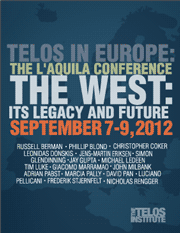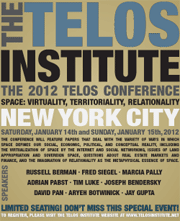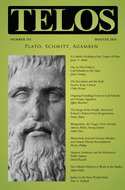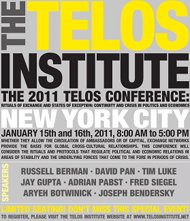By Marcia Pally · Thursday, April 27, 2017 The thoughts below were first presented at the 2017 Telos Paul Piccone Institute conference, “Asymmetrical Warfare: The Centrality of the Political to the Strategic.” On the perhaps naïve presumption that politics are grounded in ideals, norms, and values that guide (if not govern) societal conduct, I have extended the title to “Asymmetrical Warfare: The Centrality of the Ethical to Politics and the Strategic.” Since the writing of these remarks, Donald Trump has taken the office of president, promised a vast build-up of the U.S. military, and proposed large increases in the military budget alongside substantial decreases in humanitarian aid programs. He has detonated in Afghanistan the largest non-nuclear bomb in U.S. military history, he is saber-rattling with North Korea, and he has bombed Syria—all in his first 100 days, indicating a certain unconsidered readiness to use military force.
Continue reading →
By Marcia Pally · Friday, March 1, 2013 The following paper was presented at the Seventh Annual Telos Conference, held on February 15–17, 2013, in New York City.
 I’d like to begin with the idea that religion is not only useful for social service provision and various charities but that it has ideas that might be valuable, among them theologies of relationality. These are theologies that take the actions of relationship—not positions like parent/child, sovereign/subject, etc. but verbs—as their core. They, I’ll argue, offer a conceptual framework for addressing a long-running problem at least in the modern developed world. That problem is the ostensible binary choice between situatedness and separability and the unhappy results when we slip too far to one side or the other. Theologies of relationality may offer even non-believers a notion of the kinds of ideas needed to keep us from this self-induced harm. I’d like to begin with the idea that religion is not only useful for social service provision and various charities but that it has ideas that might be valuable, among them theologies of relationality. These are theologies that take the actions of relationship—not positions like parent/child, sovereign/subject, etc. but verbs—as their core. They, I’ll argue, offer a conceptual framework for addressing a long-running problem at least in the modern developed world. That problem is the ostensible binary choice between situatedness and separability and the unhappy results when we slip too far to one side or the other. Theologies of relationality may offer even non-believers a notion of the kinds of ideas needed to keep us from this self-induced harm.
Continue reading →
By Marcia Pally · Wednesday, December 5, 2012 This paper was presented at Telos in Europe: The L’Aquila Conference, held on September 7-9, 2012, in L’Aquila, Italy.
 Whatever the ostensible theme of the September 2012 Telos conference, it seems the real one was the mess in the West. Has the West lost its pizzazz, gravitas, ability to guide? Have we become too secular, merely rational, and thus paradoxically ungrounded? Or are we not rational enough, our politics and economics still beset by emotional, quasi-religious beliefs? Whatever the ostensible theme of the September 2012 Telos conference, it seems the real one was the mess in the West. Has the West lost its pizzazz, gravitas, ability to guide? Have we become too secular, merely rational, and thus paradoxically ungrounded? Or are we not rational enough, our politics and economics still beset by emotional, quasi-religious beliefs?
From my perch, the West hasn’t lost anything but rather has gotten too much of what might be a good thing were there less of it. That thing is separability, and too much of it, untempered by situatedness, yields abandonment and anomie on one hand and selfishness on the other. Of course, too much situatedness would be equally damaging—oppressive and stultifying. It is the binary choice—separabilty or situatedness—that leads the West to the worst of itself. Thus what is needed are frameworks that foster the simultaneous presence of both. Here I’ll point to one, theologies of relationality.
Continue reading →
By Marcia Pally · Tuesday, February 28, 2012 This paper was presented at the 2012 Telos Conference, “Space: Virtuality, Territoriality, Relationality,” held on January 14–15, in New York City.
 I was very glad to see the investigatory trinity of this year’s Telos conference, which focused not only on our much-discussed virtual spaces but also on old-fashioned territory and relationality. One aspect of the modern era—meaning everything in the West after, say, 1600—is our fascination with our own modernity and latest gizmos. We ascribe to them enormous power to both spiffy up and ruin our lives. A century ago, the telephone was thought to bring progress, expand information, and to destroy the morals of women who could now received telephone calls from men to whom their fathers had not introduced them. People worried, committees were formed, The Times of London was appalled: “We shall soon be nothing but transparent heaps of jelly to each other.” I was very glad to see the investigatory trinity of this year’s Telos conference, which focused not only on our much-discussed virtual spaces but also on old-fashioned territory and relationality. One aspect of the modern era—meaning everything in the West after, say, 1600—is our fascination with our own modernity and latest gizmos. We ascribe to them enormous power to both spiffy up and ruin our lives. A century ago, the telephone was thought to bring progress, expand information, and to destroy the morals of women who could now received telephone calls from men to whom their fathers had not introduced them. People worried, committees were formed, The Times of London was appalled: “We shall soon be nothing but transparent heaps of jelly to each other.”
Continue reading →
By Marcia Pally · Tuesday, February 7, 2012 Marcia Pally’s “Non-Market Motives at Work in the Market: ‘New Evangelicals’ in Civil Society in the United States and Overseas” appears in Telos 157 (Winter 2011). Read the full version online at the TELOS Online website, or purchase a print copy of the issue here.
 Since the 2008 global financial crisis, a reassessment of our global market system seems to be afoot: if neoliberalism (too much market) yields the Great Recession, if socialist planned markets (not enough market) produce the failed economies of the former Soviet bloc, and if social-market combinations (too much market centralization) progress toward the high-cost and slow growth of Western Europe, what are better options? This essay describes the economic justice efforts of “new evangelicals,” those who have left the right for an anti-consumerist, anti-militarist focus on economic justice, environmental protection, immigration reform, and racial/religious reconciliation. It reviews the history of U.S. evangelicalism, describes the current shift away from the religious right, and details “new evangelical” common-good capitalism, where the benefits of capitalist markets are preserved yet embedded in—and constrained by—common-good values. This is not alms-giving but the restructuring of opportunity for those whom the market has failed—not an undoing of market relations but a radical change of relations within the market. The undergirding religious doctrines and case studies, both domestic and overseas, are described. Against the view that linking markets to common-good principles is romantic or useless, “new evangelicals” are already on the ground, doing just this sort of linking. Since the 2008 global financial crisis, a reassessment of our global market system seems to be afoot: if neoliberalism (too much market) yields the Great Recession, if socialist planned markets (not enough market) produce the failed economies of the former Soviet bloc, and if social-market combinations (too much market centralization) progress toward the high-cost and slow growth of Western Europe, what are better options? This essay describes the economic justice efforts of “new evangelicals,” those who have left the right for an anti-consumerist, anti-militarist focus on economic justice, environmental protection, immigration reform, and racial/religious reconciliation. It reviews the history of U.S. evangelicalism, describes the current shift away from the religious right, and details “new evangelical” common-good capitalism, where the benefits of capitalist markets are preserved yet embedded in—and constrained by—common-good values. This is not alms-giving but the restructuring of opportunity for those whom the market has failed—not an undoing of market relations but a radical change of relations within the market. The undergirding religious doctrines and case studies, both domestic and overseas, are described. Against the view that linking markets to common-good principles is romantic or useless, “new evangelicals” are already on the ground, doing just this sort of linking.
Continue reading →
By Marcia Pally · Tuesday, February 8, 2011 An earlier version of this essay was presented at the 2011 Telos Conference, “Rituals of Exchange and States of Exception: Continuity and Crisis in Politics and Economics.”
 In light of the 2008 global financial crisis, a reassessment of the global market system seems to be afoot. If neoliberalism (too much market) yields the Great Recession, if socialist planning (not enough market) produced the failed economies of the former Soviet bloc, and if social-market combinations (too much centralization of the market) progress towards the slow economic growth and high-cost programs of Western Europe, what are better options? In light of the 2008 global financial crisis, a reassessment of the global market system seems to be afoot. If neoliberalism (too much market) yields the Great Recession, if socialist planning (not enough market) produced the failed economies of the former Soviet bloc, and if social-market combinations (too much centralization of the market) progress towards the slow economic growth and high-cost programs of Western Europe, what are better options?
“New evangelicals,”[1] perhaps unexpectedly for non-believers, offer a few ideas—interesting for their mix of market and common-good positions, and for an apparent paradox. “New evangelicals” work with a sophisticated notion of the common good—though their beliefs and practices rely on the very eighteenth-century principles that fostered unregulated market development. That is, they uphold unencumbered entrepreneurialism in markets, but this commitment makes them entrepreneurs for the benefit of others. This becomes more interesting when one considers that the “new evangelical” paradox has significant effect on the circulation of money and people worldwide. The material here is taken from field research that I did between 2005 and 2010 and which will appear in a book later in 2011 (Eerdmans Publishing).
Continue reading →
|
|
 I’d like to begin with the idea that religion is not only useful for social service provision and various charities but that it has ideas that might be valuable, among them theologies of relationality. These are theologies that take the actions of relationship—not positions like parent/child, sovereign/subject, etc. but verbs—as their core. They, I’ll argue, offer a conceptual framework for addressing a long-running problem at least in the modern developed world. That problem is the ostensible binary choice between situatedness and separability and the unhappy results when we slip too far to one side or the other. Theologies of relationality may offer even non-believers a notion of the kinds of ideas needed to keep us from this self-induced harm.
I’d like to begin with the idea that religion is not only useful for social service provision and various charities but that it has ideas that might be valuable, among them theologies of relationality. These are theologies that take the actions of relationship—not positions like parent/child, sovereign/subject, etc. but verbs—as their core. They, I’ll argue, offer a conceptual framework for addressing a long-running problem at least in the modern developed world. That problem is the ostensible binary choice between situatedness and separability and the unhappy results when we slip too far to one side or the other. Theologies of relationality may offer even non-believers a notion of the kinds of ideas needed to keep us from this self-induced harm.  Whatever the ostensible theme of the September 2012 Telos conference, it seems the real one was the mess in the West. Has the West lost its pizzazz, gravitas, ability to guide? Have we become too secular, merely rational, and thus paradoxically ungrounded? Or are we not rational enough, our politics and economics still beset by emotional, quasi-religious beliefs?
Whatever the ostensible theme of the September 2012 Telos conference, it seems the real one was the mess in the West. Has the West lost its pizzazz, gravitas, ability to guide? Have we become too secular, merely rational, and thus paradoxically ungrounded? Or are we not rational enough, our politics and economics still beset by emotional, quasi-religious beliefs?  I was very glad to see the investigatory trinity of this year’s Telos conference, which focused not only on our much-discussed virtual spaces but also on old-fashioned territory and relationality. One aspect of the modern era—meaning everything in the West after, say, 1600—is our fascination with our own modernity and latest gizmos. We ascribe to them enormous power to both spiffy up and ruin our lives. A century ago, the telephone was thought to bring progress, expand information, and to destroy the morals of women who could now received telephone calls from men to whom their fathers had not introduced them. People worried, committees were formed, The Times of London was appalled: “We shall soon be nothing but transparent heaps of jelly to each other.”
I was very glad to see the investigatory trinity of this year’s Telos conference, which focused not only on our much-discussed virtual spaces but also on old-fashioned territory and relationality. One aspect of the modern era—meaning everything in the West after, say, 1600—is our fascination with our own modernity and latest gizmos. We ascribe to them enormous power to both spiffy up and ruin our lives. A century ago, the telephone was thought to bring progress, expand information, and to destroy the morals of women who could now received telephone calls from men to whom their fathers had not introduced them. People worried, committees were formed, The Times of London was appalled: “We shall soon be nothing but transparent heaps of jelly to each other.”  Since the 2008 global financial crisis, a reassessment of our global market system seems to be afoot: if neoliberalism (too much market) yields the Great Recession, if socialist planned markets (not enough market) produce the failed economies of the former Soviet bloc, and if social-market combinations (too much market centralization) progress toward the high-cost and slow growth of Western Europe, what are better options? This essay describes the economic justice efforts of “new evangelicals,” those who have left the right for an anti-consumerist, anti-militarist focus on economic justice, environmental protection, immigration reform, and racial/religious reconciliation. It reviews the history of U.S. evangelicalism, describes the current shift away from the religious right, and details “new evangelical” common-good capitalism, where the benefits of capitalist markets are preserved yet embedded in—and constrained by—common-good values. This is not alms-giving but the restructuring of opportunity for those whom the market has failed—not an undoing of market relations but a radical change of relations within the market. The undergirding religious doctrines and case studies, both domestic and overseas, are described. Against the view that linking markets to common-good principles is romantic or useless, “new evangelicals” are already on the ground, doing just this sort of linking.
Since the 2008 global financial crisis, a reassessment of our global market system seems to be afoot: if neoliberalism (too much market) yields the Great Recession, if socialist planned markets (not enough market) produce the failed economies of the former Soviet bloc, and if social-market combinations (too much market centralization) progress toward the high-cost and slow growth of Western Europe, what are better options? This essay describes the economic justice efforts of “new evangelicals,” those who have left the right for an anti-consumerist, anti-militarist focus on economic justice, environmental protection, immigration reform, and racial/religious reconciliation. It reviews the history of U.S. evangelicalism, describes the current shift away from the religious right, and details “new evangelical” common-good capitalism, where the benefits of capitalist markets are preserved yet embedded in—and constrained by—common-good values. This is not alms-giving but the restructuring of opportunity for those whom the market has failed—not an undoing of market relations but a radical change of relations within the market. The undergirding religious doctrines and case studies, both domestic and overseas, are described. Against the view that linking markets to common-good principles is romantic or useless, “new evangelicals” are already on the ground, doing just this sort of linking.  In light of the 2008 global financial crisis, a reassessment of the global market system seems to be afoot. If neoliberalism (too much market) yields the Great Recession, if socialist planning (not enough market) produced the failed economies of the former Soviet bloc, and if social-market combinations (too much centralization of the market) progress towards the slow economic growth and high-cost programs of Western Europe, what are better options?
In light of the 2008 global financial crisis, a reassessment of the global market system seems to be afoot. If neoliberalism (too much market) yields the Great Recession, if socialist planning (not enough market) produced the failed economies of the former Soviet bloc, and if social-market combinations (too much centralization of the market) progress towards the slow economic growth and high-cost programs of Western Europe, what are better options? 

